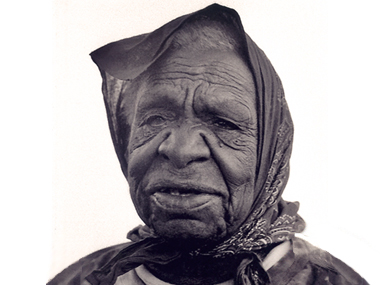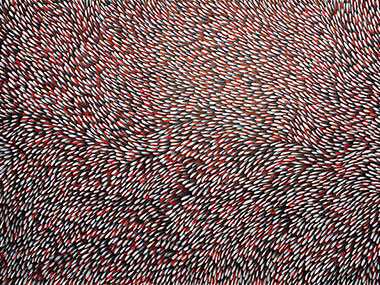Introduction - The perplexing case of indigenous art

"One of the most celebrated and collected Aboriginal artists, Emily Kame Kngwarreye." This 1994 photographic portrait was taken by award-winning fine art photographer ©Greg Weight (used with permission).
Aboriginal Art Directory | 04.12.18
Author: Andrew Bailey, Editor, The Easel
A few months ago, the Pulitzer Prize-winning US critic Jerry Saltz wrote an essay in which he referred to Aboriginal art as "outsider art". He was using this term as a 'default label' and didn't mean it as a criticism in any way. What the comment did reveal, though, was the limits of our ability to relate this body of art to the Western art canon.
Why would we want to compare these two areas of art?
I think there are two reasons. First, Aboriginal art is globally important. It holds a great fascination for those who think that relating art movements one to the other improves our understanding of all art. Sharpening our thinking on this topic will, among other things, encourage more art museums around the world to pay attention to this body of art that we are increasingly fascinated by.
Secondly, the term 'outsider art' is such an inept expression to apply to Aboriginal art whose origins are ancient, easily preceding traditional western art. Why should it be considered the outsider, rather than western art? Further, the term can be seen as implying inferior or odd, art that is so different that, while we can look at it, we cannot learn from it.
Morgan Meis, a US writer, spent some time considering these issues and his observations may surprise.
In particular, the view that we cannot learn from Aboriginal art is one that he thinks would have greatly surprised Picasso and Matisse.
As Meis explains: “The fact remains - a great many of the artists [including Picasso] who are celebrated in the galleries and museums of Modern art were utterly discontented with the boundaries of “the Modern,” of which they are often considered the exemplars. Fascinatingly, for our purposes, they would replace the Modern idea of art with something more akin to what the Aboriginal artist has been doing all along: making sacred and ritual objects that mediate between human being and cosmos.
"A potentially exciting, though also deeply unsettling thought begins to emerge as one reflects upon Australian Aboriginal art. The question becomes less, “How can we relate to Aboriginal art?” and more “How can we relate to any art?” Because in many ways, Barnett Newman was trying to make art that functions like the art of George Tjungurrayi and not the other way around."
Morgan Meis is a prominent US writer, a past winner of the Whiting Award and a regular contributor to The Easel. Here is his full essay.
URL: http://the-easel.com/essays/ancient-or-modern-the-perplexing-case-of-indigenous-art/
Share this:
»  del.icio.us
»
del.icio.us
»  Digg it
»
Digg it
»  reddit
»
reddit
»  Google
»
Google
»  StumbleUpon
»
StumbleUpon
»  Technorati
»
Technorati
»  Facebook
Facebook
Contact Details

"...a wonderful display of forms undulating across the canvas in a myriad of tiny strokes of paint" Bush Medicine by Gloria Petyarre - neice of Emily - 2001, 182x117cm (71 5/8 in. x 46 in.) Acrylic on Linen (courtesy Aboriginal Art Directory Gallery)
Further Research
Artists: George Tjungurrayi
News Tags: Andrew Bailey | Jeremy Eccles | Jerry Saltz | Morgan Meis | The Easel
News Categories: Feature
News Archive
- 04.12.18 | Remote Arts Workers at UniMelb
- 29.11.18 | KATHLEEN PETYARRE
- 25.11.18 | NONGGIRRNGA
- 19.11.18 | Two Iconic Art Galleries for the NT?
- 17.11.18 | Passing Clouds
- 13.11.18 | The Uluru Statement comes to Sydney
- 05.11.18 | Skye's the Limit
- 31.10.18 | DO WE WANT AN INDIGENOUS ARTS AUTHORITY?
- 29.10.18 | MAJOR INDIGENOUS COMMISSION FOR THE ASIAN STAGE
- 17.10.18 | Tommy Watson in Sydney
- 10.10.18 | The Aboriginal Memorial – A Smouldering Reproach
- 03.10.18 | Closing the Craft Circle
- 25.09.18 | OCEANS APART
- 13.09.18 | SYDNEY CONTEMPORARY 2018
- 11.09.18 | Alice Springs Gallery Project – Mixed Views
Advertising

